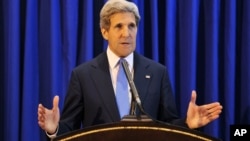WASHINGTON —
Secretary of State John Kerry announced Friday that Israeli and Palestinian officials will meet soon in Washington. While this does not mean that both sides have agreed to formal peace talks for the first time since 2010, Middle East analysts say this is a hopeful sign and that Kerry's persistent diplomatic efforts are making progress.
Kerry has made the resumption of Israeli-Palestinian peace talks a top priority, and on Friday he announced a breakthrough.
"We have reached an agreement that establishes a basis for resuming direct, final status negotiations between the Palestinians and the Israelis. This is a significant and welcome step forward," he said.
He made the announcement in Amman, Jordan, after returning from Ramallah, where he met with Palestinian President Mahmoud Abbas.
Kerry said details are being worked out, but Palestinian and Israeli officials will travel to Washington for initial talks within the next week or two. While this agreement is just a small step toward formal peace talks, regional experts say it is cause for hope.
Daniel Kurtzer, a former U.S. ambassador to Israel and Egypt, said Kerry’s comprehensive approach to bringing both sides to the table is the most serious diplomatic effort in the region in 20 years.
“He’s brought the Arab states back to the game. He has appointed General [John] Allen to look at security issues. He’s focused very much on economic and business questions and as he’s been doing the last few days, in moving between Amman, Jordan and Ramallah in the West Bank, he obviously has been looking at the substantive issues to be negotiated,” said Kurtzer.
There are no easy solutions to the issues that separate the two sides. The Palestinians want an independent state in the West Bank and the Gaza Strip, with a capital in East Jerusalem. And they set as a condition to negotiations that Israel accept the pre-1967 borders, which would expand Palestinian territory.
Israeli Prime Minister Benjamin Netanyahu has said there should be no conditions, and some hardliners in his cabinet reject any border changes.
Ori Nir, spokesman for the Jewish-American group Americans for Peace Now, said getting the two sides to even agree to talk about the border issue would be a significant achievement.
“If Secretary Kerry really has found a way to get around this issue and remove it as an obstacle, which it had been for a long time, for serious negotiations, then I think that further enhances the hope,” said Nir.
VOA State Department Correspondent Scott Stearns is traveling with Kerry, and he said little information is being shared with the media about these sensitive talks.
“He [Kerry] has kept this entire process very quiet, and again said that candid, private conversations are the very best way to give these negotiations a chance,” said Stearns.
This is the sixth trip Kerry has made to the Middle East since becoming secretary of state earlier this year.
Kerry has made the resumption of Israeli-Palestinian peace talks a top priority, and on Friday he announced a breakthrough.
"We have reached an agreement that establishes a basis for resuming direct, final status negotiations between the Palestinians and the Israelis. This is a significant and welcome step forward," he said.
He made the announcement in Amman, Jordan, after returning from Ramallah, where he met with Palestinian President Mahmoud Abbas.
Kerry said details are being worked out, but Palestinian and Israeli officials will travel to Washington for initial talks within the next week or two. While this agreement is just a small step toward formal peace talks, regional experts say it is cause for hope.
Daniel Kurtzer, a former U.S. ambassador to Israel and Egypt, said Kerry’s comprehensive approach to bringing both sides to the table is the most serious diplomatic effort in the region in 20 years.
“He’s brought the Arab states back to the game. He has appointed General [John] Allen to look at security issues. He’s focused very much on economic and business questions and as he’s been doing the last few days, in moving between Amman, Jordan and Ramallah in the West Bank, he obviously has been looking at the substantive issues to be negotiated,” said Kurtzer.
There are no easy solutions to the issues that separate the two sides. The Palestinians want an independent state in the West Bank and the Gaza Strip, with a capital in East Jerusalem. And they set as a condition to negotiations that Israel accept the pre-1967 borders, which would expand Palestinian territory.
Israeli Prime Minister Benjamin Netanyahu has said there should be no conditions, and some hardliners in his cabinet reject any border changes.
Ori Nir, spokesman for the Jewish-American group Americans for Peace Now, said getting the two sides to even agree to talk about the border issue would be a significant achievement.
“If Secretary Kerry really has found a way to get around this issue and remove it as an obstacle, which it had been for a long time, for serious negotiations, then I think that further enhances the hope,” said Nir.
VOA State Department Correspondent Scott Stearns is traveling with Kerry, and he said little information is being shared with the media about these sensitive talks.
“He [Kerry] has kept this entire process very quiet, and again said that candid, private conversations are the very best way to give these negotiations a chance,” said Stearns.
This is the sixth trip Kerry has made to the Middle East since becoming secretary of state earlier this year.





